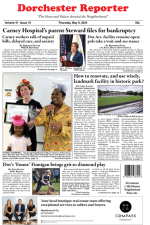September 6, 1999
Dorchester Streets. The name itself is somewhat deceiving.
In reality, this new 278 page memoir, written by neighborhood native Robert Louis Sheehan, is more of a tribute to the people of depression era Dorchester than the streets and homes they inhabited.
In particular, it is a moving recollection of the turbulent '30s and '40s as experienced by one particularly hard-hit family- the Sheehans. Ravaged by a poverty that was profoundly worsened by the misdeeds of an alcoholic father, it is, in one sense, Dorchester's very own version of Angela's Ashes.
Unlike Frank McCourt's Pulitzer Prize winning autobiography, it is a safe bet that Dorchester Streets won't make it onto the best seller's list any time soon. For one thing, only 335 copies are in existence, all published by the author himself.
Despite its modest distribution, however, Dorchester Streets is destined to be a critically important contribution to the survival of the neighborhood's 20th century history. Although it focuses centrally on the trials and triumphs of a single family, Sheehan's vivid descriptions of growing up in Dorchester combine to form a rare portal into a way of life that is, today, part of the past.
Sheehan was born in 1924, the second son of a young couple with a promising future. His father, Francis X. Sheehan, was the product of an active Irish-American family in St. Peter's parish, while mother Mary (nee McKeon) hailed from a lace curtain New York Irish background. As their young family blossomed, so did difficulties, brought on in part by the universal woes of a worsening depression and, more seriously, by the alcoholic tendencies of Francis Sheehan.
As the 1930s progressed, the Sheehans were almost entirely dependent on the good will of family members, grocery store creditors, landlords, and the fickle cycles of neighborhood politics for their survival. A ward 17 loyalist of James Michael Curley, Francis Sheehan's employment- and thus the family's well being- was forever tied to the fortunes of the Rascal King. There is more than one juicy Curley anecdote in this memoir, which among other things, challenges what Sheehan describes as the "myth" of Curley's political machine.
Constantly broke, the sight of an eviction notice was nearly as common as a report card for the Sheehan kids, who are shuttled from one apartment to another in the neighborhood, almost all of them in the Codman Square and Ashmont areas. Sheehan's book, then, is constructed in a parallel fashion, tracing the family's footsteps from street to street, house to house.
Despite the unrelenting hardships, Dorchester Streets has a decidedly upbeat tone, what Sheehan refers to as a "tragicomedy." Intimate details about his own milestones on the road to Dorchester High, the Marines, Boston College and maturity are balanced perfectly with anecdotal information about the neighborhood's history and geography. The result is an over-the-back-fence style of storytelling that captures the distinct local flavor of a neighborhood woefully unrepresented by the written word.
In one instance, Sheehan's narrative strays into the always controversial local debate about what to call the neighborhood's most celebrated architectural achievement: the three decker.
"The only ones who call them "triple-deckers,"- as though you were dealing with an ice cream sundae or a club sandwich- are the suburbanites and the carpetbaggers who have come not to live there but to exploit contemporary Dorchester," writes Sheehan. "Long live Ridgewood Street, Regina Road and all the other Dorchester streets where the three-decker still flourishes!"
Such local neighborhood rhetoric is at once the charm and the curse of Dorchester Streets. It is sometimes excrutiatingly local, right down to the color of paint on a street hydrant and the route he followed to school each day. Still it is a a tour-de-force of neighborhood storytelling. For those without a keen interest in the neighborhood, it will likely prove to be overwhelming, like a sociology text. But, for those with a thirst for neighborhood history and local color, Dorchester Streets will be a welcome companion.
No matter, Robert Louis Sheehan, who today lives in downtown Boston near Prudential Center, is decidely uninterested in cracking anyone's best sellers list.
"This book cost me a lot of money to publish," he admits, "and I'm not going to make any of it back."
"I just want to get it in as many hands of Dorchester people as I can."
For the sake of the neighborhood and its history, that would be an excellent idea.
(Dorchester Streets is self-published by the author. It is available by contacting the author by e-mail at sheehanr@bc.edu)


